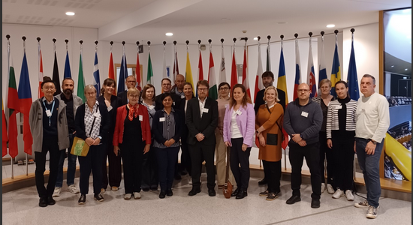Project Description

The Atmosphere and Climate Competence Center (ACCC) recently visited the European Parliament in Brussels on September 18th and 19th, 2023. This visit was hosted by Member of the European Parliament (MEP) Heidi Hautala. The delegation from ACCC consisted of 20 researchers from the University of Helsinki, the Finnish Meteorological Institute, Tampere University, and the University of Eastern Finland. ACCC’s primary goal is to combine scientific excellence with a significant societal impact, particularly in support of the European Green Deal and climate resilience. The purpose of this visit was to foster knowledge exchange between policy and research perspectives while strengthening connections to knowledge-based EU climate policies. Additionally, the visit facilitated direct interaction between ACCC researchers and experts from the European Commission, setting the stage for future knowledge sharing.
On the first day, Monday, September 18th, after an introductory tour of the parliament, ACCC organized a panel discussion titled “EU Arctic Strategy – Current Status and Future Needs” at the European Parliament. The panel was moderated by Hanna Lappalainen from ACCC/UH. Professor Tuukka Petäjä (ACCC/UH) delivered a presentation on “Arctic Collaboration,” while MEP Urmas Paet and Mrs. Clara Ganslandt, Special Envoy for Arctic Matters and Head of the Western Europe/Arctic/Regional Division from EEAS, shared their insights on the current policy landscape and future prospects. One pressing issue discussed was the availability of data from Russia, especially given the challenging geopolitical situation. Policymakers require more precise information as the Arctic has been warming three times faster than the global average over the past 50 years. It what also discussed what practical actions could be expected. China plays important role here.
On Tuesday, September 19th, several panel discussions were held at the Finnish Liaison Office for EU Research and Development, situated at the Permanent Representation of Finland in Brussels. The topics covered a wide range, from “The Role of Science in Environmental and Climate Diplomacy in the Current Geopolitical Context” to “New Trends in Climate Policy and Law and Global Stocktake,” and even “EU Forest and Agricultural Policy and Its Global Impact.”
Academician Markku Kulmala (INAR, ACCC) delivered a comprehensive talk on science diplomacy and introduced The World Academy of Sciences (TWAS) as a promising asset in this field. Rosaline Thakur addressed the challenges related to global in-situ observations, emphasizing the need for collaborative “we-science” to tackle the effects of geopolitical shifts on resources. Rosa Rantanen (INAR, ACCC) presented on climate safety and the role of civil society, highlighting the importance of basing this movement on scientific facts. Invited panellists, including Chantal Marijnissen (Environment, Sustainable Natural Resources, DG INTPA) and Tibor Stelbaczky (Energy Diplomacy, EEAS), discussed various dimensions, such as collaboration with Africa and regional interests in climate policy. They stressed the importance of shared understanding and the role of science, exemplified by IPPC reporting, in establishing common ground. The discussions concluded with a focus on the urgency of addressing climate change through changes in human behavior. Also the need to calculate the costs of “no action” was highlighted, and MEP Sirpa Pietikäinen raised questions about financing TWAS and establishing long-term collaboration, as well as the role of social sciences in countering populism and translating science into political action through independent science panels.
The discussion about “New Trends in Climate Policy and Law, and the Global Stocktake” was led by MEP Heidi Hautala. Hautala believes we should shift from making policies focused on short-term concerns, often influenced by election cycles, to crafting long-term policies. There are some high momentum issues like climate financing in the Global South. Questions arise regarding consumption, achieving Sustainable Development Goals (SDGs), encouraging private actions, and addressing resistance to regulations – all of which significant challenges. Additionally, dealing with climate refugees and adapting to issues like Himalayan ice melting should on the agenda. Kati Kulovesi (ACCC/UEF) presented the EU climate law post “Fit for 55” and discussed what comes next. Kulovesi pointed out that EU climate policy tends to prioritize goals and specific policies, but there’s a need to pay more attention to the quality of climate governance procedures. The challenge lies in making these policies more acceptable and have support for the transition toward climate neutrality. International fairness and equality in climate policy are also crucial aspects to consider. In Finland, there’s has been the 1st climate mitigation case where two non-governmental organizations (NGOs) argued that the Finnish Government was not adequately responding to climate laws. This case represents the first instance of such a climate-related legal challenge in Finland. Sami Paatero (ACCC/UH) introduced the Climate Analytics Finland and the new science based service for carbon removals verification system. Damien Meadows and Madelaine Tuininga from DG Clima and Trade participated in the discussions.
Anna Lintunen (ACCC/UH) moderated a discussion about the European Union’s policies on forests and agriculture within the global economy. Olli Tahvonen, also from ACCC/UH, explained how to calculate the cost of removing of carbon dioxide from the atmosphere. Tahvonen sees vast economic potential for forest owners in using forests as carbon sinks. However, the EU’s forest planning for the years 2021-2024 was quite confusing, as it did not recognize forests as valuable economic resources. The EU’s emission trading system has been successful after a learning period. During the discussion, we heard perspectives from MEP Nils Torvalds, Christian Holzleitner from DG CLIMA, and Astrid Schomaker from DG ENV. Carbon farming has both advantages and challenges. The benefits include increased removal of carbon dioxide from the atmosphere, which contributes to greater biodiversity and the preservation of natural environments. However, challenges revolve around cost-effectiveness, the availability of advisory services, and financing issues.
ACCC delegation ACCC brochure_EU Parliament trip_18-19Sep2023_reduced
